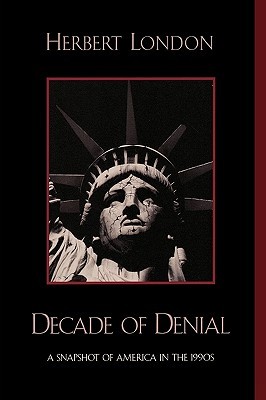Herb London’s newest book, a relentlessly critical view of American morals and culture in the 1990’s, makes two pivotal observations. First, the moral deterioration that journalists associate with the Republican “decade of greed” (the 80’s) actually took place, partly thanks to the media, in the 90’s. Second, the major impact of the Clinton presidency was moral:
Americans appear to be lying to themselves throughout the decade. It is not the “economy, stupid” but culture that counts. A nation that cannot control its emotions cannot long sustain its prosperity. If norms can be discarded like used newspapers, then the characteristics necessary for success will at some point be undermined.
Referring to Clinton’s lust and mendacity, London remarks that, “if Americans are shockproof, if a president can win support as long as the gross national product rises, political compromises of major proportions are possible.” What the author is suggesting is that, if a population (which it may be wrong to regard as made up of citizens) can glorify a lying rake as its national leader, it may be ready to give up its liberties entirely.
London may understate the problem. What distinguished the Clinton years was the prevalence of a repulsive double standard. In return for Clinton’s support for easily obtained abortions and draconian measures applied by government agencies against suspected sexists in the workplace and in education, this overgrown adolescent was given unlimited opportunities by the media and liberal opinion makers to abuse women. And he could do so, in his palatial workplace or anywhere else, with legion defenders. Nothing resembling such tartuferie (what London appropriately calls “sanctimony”) has been seen since Louis XIV enforced Catholic doctrine and public morals while devoting his private life to dissipation. Unlike Clinton, however, Louis upheld something like family institutions and financed a cornucopia of fine art, architecture, and literature, from which his nation continues to benefit. The fruit of the Clinton years is the cultural rot, characterized by rap music and academic victimology, whose putrescence London, despite his best efforts, can only begin to depict.
Scattered insights from this far-ranging jeremiad are worth recalling. Concerning the designation “postmodern,” London asks how anyone could take seriously something “so blatantly self-contradictory.” “How can a theory be beyond new? How much beyond can it be, and who determines that condition?” London is right to ridicule this fluffy term that self-important academics attach, cast into mystifying phraseology, to their recycled leftist sociology. One cannot go beyond the modern, particularly from the left, whose defining ideology is hypermodernity generating Western self-hatred. London is also correct that what now marks rap and other pseudoartistic sludge as “art” is its offense, real or perceived, to the bourgeoisie. And he may be right in observing that the “counterculture composed of the adversaries of every bourgeois belief” has won a victory that can still be reversed. Although it does not seem likely, the antibourgeois culture that has taken hold in the last generation might be undone by a new adversary elite that has its own “guerrilla strategy for reclamation.” This new elite, however, is not likely to come from either of the two major political parties—or from the giddy celebrants of the global market. The saving elite must represent an alternative culture—that is, it must be rooted in specific communities and speak for a traditional way of life. Otherwise, it will be nothing more than a variation on today’s popular entertainment and multicultural gibberish.
The process London describes as cultural, moral, and educational decay began well before the 90’s, and it might be objected, therefore, that it is inaccurate to lay all of these troubles at the doorstep of the Clinton era, particularly since some social problems, such as teenage pregnancy and urban violence, were, in fact, alleviated during that decade. London, who makes it clear that he is talking about a cultural trend extending over many years, would not deny this. The partial slowing of social breakdown, however, also has a demographic aspect: There are now fewer American teenagers, including those belonging to the underclass, than there were in the 80’s. More significantly, the disintegration of the traditional family, the gutting of educational standards, the politics of victimology, and the war against traditional social virtues all continue to unfold. In this sense, the “decade of denial” marches on.
On a more pleasant note, I am happy to discover that Professor London, like me, grew up rooting for the Brooklyn Dodgers and loathing the New York Yankees. Like him, I admired Joe DiMaggio as a worthy competitor, albeit one who retired before I became a full-fledged baseball fan. Although I, too, adored Jackie Robinson, it was not for his achievement in breaking the race barrier with tact and restraint but for winning games for the team that my highly partisan relatives brought me to Ebbetts Field to watch. If Robinson had broken the color line while playing for the Yankees, I would not have liked him any better than I did, say, Mickey Mantle.
[Decade of Denial: A Snapshot of America in the 1990s, by Herbert London (Lanham: Lexington Books) 181 pp., $24.95]

Leave a Reply